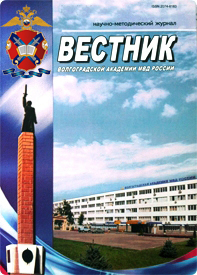The article is devoted to the interaction of law enforcement officers with the media. The recent practice of domination of criticism in the media (sometimes quite vicious and biased), subconsciously creates a doubt of law-abiding citizens in the expediency of justice assistance, which generally predetermines the lack of their support and help in the fight against crime. Law enforcement officials, same as journalists and TV presenters, should act as a «regulator of public opinion». It should be taken into account that a person preparing for a speech, will be the center of critical attention. Employee appearing on television must be telegenic, have a clear diction and a pleasant tone of voice. The official in charge of the criminal proceedings should filter the amount of information brought to the public. In the materials of the investigation transferred to the media, there is no need to inform the public about future proceedings, the confessions of the accused, the reliability of eyewitness testimony, etc. In the interests of the investigation, the focus should be not on the sources of evidence, «endowed with the gift of speech», but on the «silent witnesses», the outcome of the investigatory actions, etc. The ability of the media should find wider application in the prevention of crimes, the education of citizens in the spirit of respect for the law and intolerance for unlawful behavior.
cooperation, law enforcement, investigator, media, population, crime, criminal case
1. «Plan Dallesa» dlya Rossii. Istoriya i sovremennost' [Elektronnyy resurs]. URL: http:// www.voskres.ru/articles/vdovin2.htm (data obrascheniya: 10.04.2015).
2. Kriminal'naya situaciya v RF i ee tendencii / nauch. ruk. M. M. Babaev. M., 2009. S. 159¾163; Vasil'ev V. L. Yuridicheskaya psihologiya: uchebnik. 6-e izd., ispr. i pererab. SPb., 2009.
3. Zamylin E. I. Sredstva massovoy informacii i ih rol' v obespechenii bezopasnosti uchastnikov ugolovnogo processa (pozitivnye i negativnye momenty) // Obschestvo i pravo. 2009. № 1. S. 250¾258.
4. Rekomendacii po rabote so sredstvami massovoy informacii (zarubezhnyy opyt) // Informacionnyy byulleten' SK pri MVD Rossii. 1997. № 4.
5. Salimov K. N. Sovremennye problemy terrorizma : monogr. M., 1999. S. 194; Petrova A. N. Protivodeystvie rassledovaniyu i mery ego preodoleniya: ucheb. posobie. Volgograd, 2002. S. 93; Shuruhnov N. G. Kriminalistika: uchebnik. 2-e izd., ispr. i dop. M., 2008. S. 464.
6. Ovchinskiy A. S. Informaciya i operativno-razysknaya deyatel'nost': monogr. M., 2002. S. 74; Bykov V. M., Kolesnikova T. V. Osobennosti rassledovaniya vymogatel'stva, sovershennogo prestupnymi gruppami: ucheb. posobie. Saratov, 2006.
7. Osnovy bor'by s organizovannoy prestupnost'yu: monogr. / pod red. V. S. Ovchinskogo, V. E. Eminova, N. P. Yablokova. M., 1996. S. 278, 286; Golovin A. Yu., Dubonosov E. S. Ispol'zovanie sredstv massovoy informacii v raskrytii i rassledovanii prestupleniy : ucheb. posobie. Tula, 2001. S. 64; Vasil'eva O. A., Korma V. D. Psihologicheskiy reagent v kriminalistike: monogr. M., 2008. S. 91¾93; i dr.
8. Meshkov V. M., Grigor'ev A. N. Ispol'zovanie sluhov v raskrytii i rassledovanii prestupleniy // Vestnik kriminalistiki. 2004. Vyp. 3. S. 35¾39.









